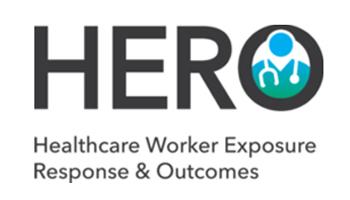HOW CAN WE HELP YOU? Call 1-800-TRY-CHOP
In This Section
HERO Registry Gives Healthcare Workers a Voice During COVID-19 Pandemic

The HERO Registry will help researchers understand the needs of healthcare workers during the COVID-19 pandemic.
shafere1 [at] email.chop.edu (By Emily Shafer)
Researchers at Children’s Hospital of Philadelphia are part of a network of institutions that designed the Healthcare Worker Exposure Response and Outcomes (HERO) Registry, seeking to understand the needs and concerns of healthcare workers during the COVID-19 pandemic.
About 13,000 registry participants have enrolled so far from all 50 states, and Registry leaders are urging all U.S. healthcare workers in any profession – not just clinicians – to take part.
One of those leaders is Christopher Forrest, MD, PhD, professor of Pediatrics at CHOP and Perelman School of Medicine at the University of Pennsylvania, principal investigator for PEDSnet, and chair of the HERO Registry sub-committee. Dr. Forrest encouraged everyone working in a healthcare setting, including food service workers, environmental service workers, lab technicians, administrators, security guards, interpreters, and transporters, among others, to participate in the HERO Registry.
The purpose of the Registry is to provide access to state-of-the-science preventive therapies, such as vaccines, tools and technologies that can help healthcare workers lessen the impact of the pandemic on their heath and lives. Dr. Forrest pointed out that never before have we in the United States formed a national community of all people involved in the health of the nation.
“What’s unique about this is that we are developing a community, with a goal of recruiting over 100,000 healthcare workers across the country, with the purpose of better understanding how to improve their health and lives during the pandemic,” Dr. Forrest said. “The registry is a way for us to collect information that can inform that question. It also helps us understand the priorities that healthcare workers have.”
Those enrolled in the registry will be offered participation future clinical trials related to COVID-19 or other research studies. For example, HERO sub-studies in progress will evaluate various tools and applications to help healthcare workers manage their health and well-being, and reduce stress.
“What we found in the first 8,000 people we’ve analyzed is that there is a lot of emotional distress, worry, stress, and problems sleeping,” Dr. Forrest said. “The participants have also indicated that they have financial concerns. Addressing these special needs of healthcare workers is going to be very important.”
The Duke Clinical Research Institute is coordinating the HERO Registry, which is funded by a Patient-Centered Outcomes Research Initiative (PCORI) Award. The registry is utilizing the National Patient-Centered Clinical Research Network (PCORnet), a network of hospitals and institutions that collaborate for research. CHOP is involved through PEDSnet, a PCORnet partner network of children’s hospitals.
Those who sign up for the registry will receive regular surveys and will answer questions about their needs or concerns while working during the pandemic. Three priorities emerged during the first round of surveys, according to Dr. Forrest. The first involved antibody testing, including how to get access to it and what immunity to COVID-19 means. The second priority was appropriate access to PPE, and the third priority was knowing the ways the virus can be transmitted.
Dr. Forrest anticipates that the HERO Registry will last as long as the pandemic continues, and it will serve as a platform for any kind of research activity that can improve the health of healthcare workers, and help protect healthcare workers from infection or transmitting the virus. Although traditional studies typically take a year or longer from conception to enrollment, the Hero Research Program is designed to be flexible and nimble.
“This is a community that stands ready and willing to be involved in studies that can help address their needs during this pandemic,” Dr. Forrest said. “We’re in COVID time now, and we need to be ready. I want tools to help healthcare workers available in weeks not years. That’s one of the values of this registry.”
For more information, healthcare workers can visit the HERO Registry.